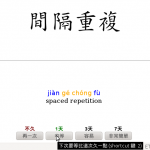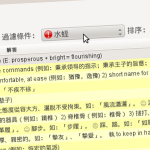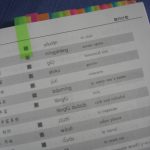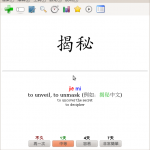Articles tagged with ‘SRS’ Page 2
-
Answer buttons and how to use SRS to study Chinese
Spaced repetition is very powerful compared to massed repetition, which is why software utilising the spacing effect is growing ever more popular. In this article, I discuss how to review vocabulary using SRS, including how to use the various answer buttons and some other functions commonly available.
Read → -
Dealing with tricky vocabulary: Killing leeches
Leeches are words or characters that you keep forgetting and therefore consume much more time than other words or characters. Rather than trying to hammer these words into your brain, a specific strategy is needed to kill the leeches. This article deals with just that, how to handle difficult vocabulary you keep on forgetting.
Read → -
Spaced repetition isn’t rote learning
Spaced repetition might on the surface look like it’s rote learning, but I argue that it isn’t. Firstly, spaced repetition isn’t about learning as such. You’re supposed to use smarter methods to learn the words first and then simply review to keep the knowledge fresh. Secondly, spaced repetition won’t degenerate to rote learning if you are alert and avoid cramming of any kind.
Read → -
Anki, the best of spaced repetition software
Of all the various websites and programs out there to help you learning Chinese, Anki is probably the most important one. There are numerous software to handle vocabulary learning, but in my experience, none of them are as versatile and dynamic as Anki.
Read → -
Spaced repetition software and why you should use it
Spaced repetition means that you review words you want to learn in certain intervals to maximise learning efficiency. Since this involves keeping track of much data, a computer program is needed to handle it properly. Spaced repetition software is very powerful and can be used for many things, but learning vocabulary and characters are perhaps the most important applications.
Read →




